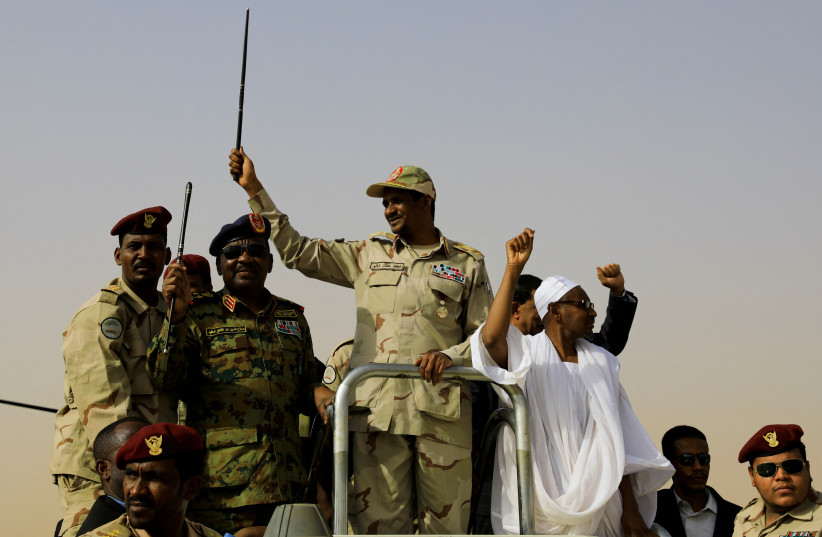Fighting continued in Sudan for a second day as the Sudanese regular armed forces (SAF) clashed with the Rapid Support Forces (RSF).
The SAF is Sudan’s army and is loyal to the military commander, turned de-facto ruler of Sudan, General Abdel Fattah Al-Burhan while the RSF, a paramilitary force, is run by a leader known as ‘Hemedti,’ whose official name is General Muhammad Hassan Daglo. These are two important military forces who have been running the country since the 2019 Sudan revolution that saw Omar al-Bashir pushed out of power. The unfolding civil conflict is important because it is in contrast to the rest of the Middle East where peace deals and reconciliation are the norm.
Sudan was supposed to transition to civilian rule after 2019. However, in 2021 the military launched a kind of coup that displaced these attempts. Nevertheless, the military continued to claim it would eventually hand over power. In many ways, the shifts in Sudan are similar to some of the other long-term processes of the Middle East. In many other states, there were changes in power linked to the Arab Spring. In Sudan, the process was a bit different because the Bashir regime was an extremist Islamist regime linked to the Muslim Brotherhood. It was also responsible for the genocide in Darfur. Sudan is a part of the Arab League, but it is also a country that links Sub-Saharan Africa with North Africa and the Sahel.
After Sudan’s 2019 revolution, the country moved towards normalization with Israel. Hemedti praised normalization in an interview in 2020. Prime Minister Benjamin Netanyahu met Burhan in Entebbe in 2020. At the time, Netanyahu said he believes that Sudan is headed in a new positive direction and he expressed his views to the Secretary of State of the United States of America, according to Israel’s Foreign Ministry.
The removal of the Bashir regime appeared to be a chance for Sudanese to have more freedom and less religious extremism at the top. In a recent piece at the Middle East Media Research Institute (MEMRI), Alberto M. Fernandez wrote about the struggle in Sudan in a piece called “One Thirst For Power In Sudan, As Two Armed Factions Maneuver.” Alberto M. Fernandez is Vice President of MEMRI and was a former US charge d'affaires in Sudan (2007-2009). He gives a good explanation of the roots of the conflict. “The RSF was the outgrowth of something regimes in Khartoum had done for years – create paramilitary or alternate armed forces to either be a counterweight to the regular army or to do the dirty work that the army couldn't or wouldn't do. The RSF is, at its core, essentially a tribal militia initially created as cheap cannon fodder that then evolved into a military pseudo-fire brigade or praetorian guard for the Khartoum regime.”

Countries in the region busy with other matters
Now these two forces are fighting each other and Sudan’s people are paying the price. The clashes look like they will undermine what little stability the country had. Neighboring states, such as Egypt, are closely monitoring the situation. Egypt, who leadership is also drawn from the military, would likely support Burhan remaining in power. The Gulf States are also interested in calm in Sudan. Here is a chance for Saudi Arabia, Egypt and others to see if they can also broker a ceasefire in Sudan. On the other hand, Riyadh’s hands are full with talks about Yemen and reports that a Hamas delegation may be on the way to Saudi Arabia. Egypt and Saudi Arabia are also more focused on Syria; and Egypt is working on reconciliation with Turkey.
It should be noted that Sudan is also of interest to other states. Turkey had sought to increase investment there before 2019. Russia also has interests there, and this leads to concerns in the West. However, the West has generally only put out statements about the fighting. It’s not clear if many countries will do much to help end the crisis. The National in the UAE noted early on Sunday that “calls for a cessation of hostilities made by world powers, including the US, UN, the European Union and the African Union went unheeded.”
The RSF has made claims about various gains, however it is assumed that the military has more assets than the RSF, in terms of warplanes and tanks and the kinds of heavy weapons that may decide a long conflict. Al-Arabiya reports that several officials, including RSF sector commanders, have been killed in fighting.
